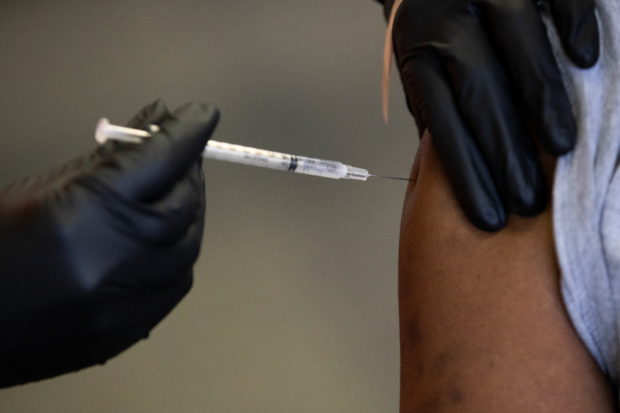US FDA authorizes Pfizer/BioNTech, Moderna COVID-19 boosters

FILE PHOTO: A patient receives their coronavirus disease (COVID-19) vaccine booster during a Pfizer-BioNTech vaccination clinic in Southfield, Michigan, U.S., September 29, 2021. REUTERS/Emily Elconin
The U.S. Food and Drug Administration on Friday authorized booster doses of COVID-19 vaccines for all adults who were vaccinated with the Pfizer Inc and partner BioNTech SE shot and the Moderna Inc shot.
The regulator’s decision paves the way for millions of Americans to get additional protection and is aimed at addressing waning protection among fully vaccinated Americans in the face of Delta variant-driven breakthrough cases of the illness.
The FDA authorization paves the way for all adults who had their second dose of Pfizer/BioNTech or Moderna six months prior, as well as those who had the Johnson & Johnson Inc. shot 2 months ago, to get a booster dose in the United States.
The final regulatory review moves to a meeting of an advisory committee to the Centers for U.S. Disease Control and Prevention (CDC) on boosters scheduled for noon on Friday, and then a recommendation from the agency’s director, who has publicly supported boosters for all.
Over 31 million Americans have already received a booster shot, but current CDC guidelines recommend extra doses only for some population groups.
Article continues after this advertisementA broad recommendation could bring uniformity in the country at a time when individual states such as Colorado, California and Massachusetts have already made all adults eligible for COVID-19 vaccine boosters.
Article continues after this advertisement“The messaging has become muddled,” Dr. Leana Wen, an emergency physician and public health professor at George Washington University, said in a post on Twitter.
Pfizer previously requested authorization for all people aged 16 or over, but U.S. health advisers held back on extending boosters to everyone, partly because there was not enough evidence of waning immunity or the need in younger people.
Some of the CDC’s outside advisers had raised concerns that booster doses are not needed in young, healthy individuals for whom the initial vaccination provides sufficient protection from serious disease and death.
Pfizer has since reported data from a large clinical study that showed a booster dose of its vaccine was 95.6% effective against the coronavirus when compared with a vaccinated group that did not get the third shot.
Israeli data has also showed that administering Pfizer/BioNTech booster shots widely slowed virus transmission.
Top U.S. infectious disease doctor Anthony Fauci said earlier this week that boosters can prevent infection as colder weather and indoor gatherings lead to a rise in cases.
There has been “a ground swell of interest in boosters-for-all,” said Dr. William Schaffner, a leading infectious disease expert from the Vanderbilt University School of Medicine who serves as the liaison for the National Foundation for Infectious Diseases.
While the panel could be split, Schaffner said, he believes it is likely they will vote in favor of extending booster eligibility.
Based on research showing vaccine-generated antibody levels dip after several months, the panel is likely to recommend boosters for a broad population, said Dr. Robert Klugman at UMass Memorial Health Care in Massachusetts.
Booster doses of messenger RNA (mRNA) vaccines from Pfizer/BioNTech or Moderna are currently available for people who are immunocompromised, those who are aged 65 and above, and for individuals at high-risk of severe disease or who are regularly exposed to the virus through work or living conditions.
Anecdotal reports suggest that Americans have been largely able to get boosters, whether or not they are eligible.
“There is a lot of boosting going on that does not conform to the current, somewhat more restrictive set of recommendations,” said Schaffner.
Nearly 60% of adult Americans – some 195.6 million people – are considered fully vaccinated, having received two doses of either the Pfizer/BioNTech or Moderna vaccines, or one shot of the Johnson & Johnson vaccine.